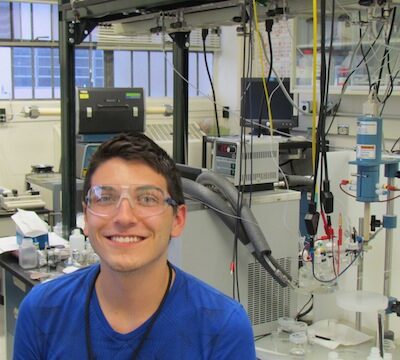Brendon McNicholas Sciences
Electrochemical Characterization of First-Row Transition Metal Corrole Complexes for Use as Oxygen Reduction Catalysts
Research in alternative energy has become increasingly urgent in recent years due to constantly increasing pollution and depletion of traditional energy sources. One of the most compelling devices in the field is the fuel cell, a means for converting hydrogen and oxygen into useful energy. To contribute to the advancement of the field of alternative energy, this thesis aims to further the characterization of an oxygen reduction catalyst for a PEM fuel cell. Literature has shown that certain first-row transition metal corrole complexes are active for catalytic oxygen reduction, and the projects primary objective is to electrochemically characterize these complexes to determine which compounds are most effective in oxygen reduction catalysis.
Scholars Journal
At the beginning of this summer, I was unsure of what to expect from my research experience. This was the first time I was working on an independent research project full-time. I had a lot of ideas about what data I wanted to collect, what I wanted to learn, and what I wanted to accomplish in these three months. It was both exciting and slightly unnerving to think about the project that lay before me. I decided that I was going to give it my all and attempt to use the experience to both accomplish a significant amount on a project about which I am very passionate and to grow as a chemist and researcher. Throughout the summer, there were many stumbles along the way. I took these issues in stride and reminded myself that this was an integral part of the research process. It was not uncommon for me to collect data for two days, only to find out that the data was incorrect due to one small parameter. In reality, these mistakes were actually a positive result. Using mistakes as a learning tool so one understands more and prevents these mistakes in the future is crucial. Also, having consistent discussions with my mentor and other advisors made mistakes even more fruitful, as talking about them with experienced researchers sparked ideas and learning. Because of the Haas Scholars program, I was able to travel to Los Alamos National Laboratory, where I worked with our research groups collaborator on my project. This experience was extremely beneficial due to the one-on-one interaction with an experienced electrochemist who was able to clear up all misunderstandings and confusions I had about the techniques and theory of electrochemistry. The opportunity to perform research in a different location was also extremely beneficial, as conducting research in a new environment brings fresh perspective to ones work. In terms of the progress that I made on my project, I am very content. Even though I did not collect every piece of data I hoped to gather, I am pleasantly surprised at the amount of understanding of theory and applications of electrochemistry I gained. As many others have said about summer research and the Haas Scholars program, the summer flies by, and one wonders where the time has gone. Being passionate and excited about my project made the summer very enjoyable. This experience has reaffirmed my desire to continue with research in chemistry and has given me a great deal of experience in what to expect from graduate school. The most important thing is to cherish the opportunity and not get discouraged when one's project goes awry. Having an open group of colleagues who are going through the same research experience as myself provides an excellent support system and outlet for discussion of issues and generation of ideas. I am very happy with how my summer turned out, and I hope the school year continues to generate exciting results!